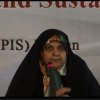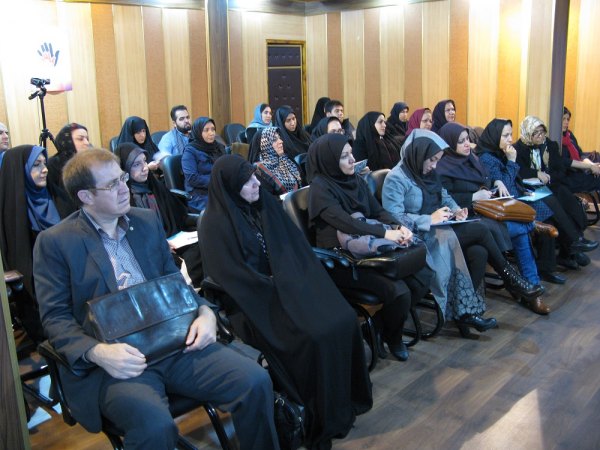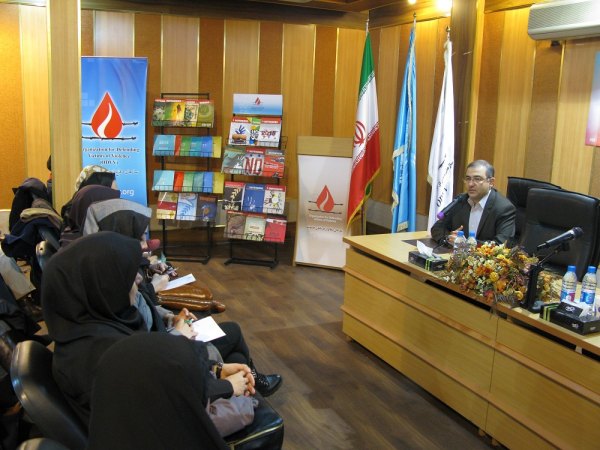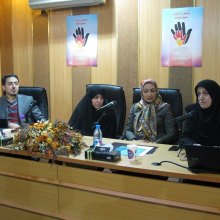
Education Course on the Introduction to Family Law
Education Course on the Introduction to Family Law
As part of the commemoration of the International Day for the Elimination of Violence against Women and the promotion of its volunteers, the ODVV successfully held a technical sitting on the Introduction to Family Law on 22 November. In this sitting which was held at the ODVV headquarters and was welcomed by the audience, experts on the subject reviewed the various dimensions of family law and legal methods for the prevention of violence against women. The event was held in the presence of lecturers and experts, and a number of ODVV honorary members and those interested on the subject at hand. The experts spoke about family law nd effective factors in strengthening the subject and effective solutions to problems.
The session began with the welcoming speech of Mr. Siavash Rahpeik, the ODVV director who stressed on the importance of women and family related discussions.
This was followed by the speech of Dr Mehrshad Shababi, lecturer at Shahid Beheshti University, who while identifying women and family rights in the international system, spoke about the importance of rights for women throughout history.
She said that the Civil Code deemed the family as a fundamental institution of society and stresses that all laws and regulations and plans must be to facilitate the forming of the family and guarding its sanctity and stability of family relations on the basis of laws and Islamic morals and the government is duty bound to facilitate the basis for the development of the woman’s character and support mothers and create competent courst for the preservation and survival of the family.
The next speaker was Dr. Hassan Fadaee, lecturer at Shahid Beheshti University who gave an introduction to violence in the laws that include social violence against women and mental violence or abuse against women, and while stressing on verses from the Koran and reputable quotations, he said that the preservation of values and their attention are the strengthening of the foundations and survival of families. While reviewing methods to combat violence which have been reviewed in various civil institutions and also the press, he noted that for as long as morality is not institutionalised within society, these types of laws that create human morality and dignity, will not have any effect. Dr Fadaee said that the guarantee of for the mental implementation must be activated, and while being equipped with religious teachings, we must prevent he flames of rage and violence from engulfing. At the end of his speech while pointing at the increasing divorce statistics within our society said that when love, kindness and morality is threatened, anger and abusive behaviour strengthen. While raising their scientific and cultural levels and awareness of moral principles and religious teachings, and the promotion of their tolerance will itself result in the rise in good relations and morality in the family institution.
The final speaker was Dr Homa Garmaroodi, university lecturer who while referring to structural victim of crime, saw the causes as 1 – crimes, 2 – war and 3 – structure.
She said that laws must be human and they must not be influenced by gender discrimination and referred to the value of legal equality. She said: “Today, violence is not just physical but some existing laws and their shortfalls can result in violence against women.” Referring to the Civil Code and important contents such as income, child custody, the marriage of children under 13, women’s Diah and the Family Protection Law, she said that each one of these can result in some form of violence and abuse along the way.
She also deemed judicial procedures in many instances result in violence and said, “in many instances the procedure that the honourable judges can adopt, must safeguard the observation of women’s rights. Even laws whose shortfalls result in the violation of women’s rights, until before amendment can through this result in the realisation of women’s rights.
At the end while explaining some points and pointing out the volume of case files in the family courts in Iran, she said that fortunately we are witnessing that the legislator is trying to amend laws which is expected to view equality of men and women in the eyes of the law.


 Reload
Reload



